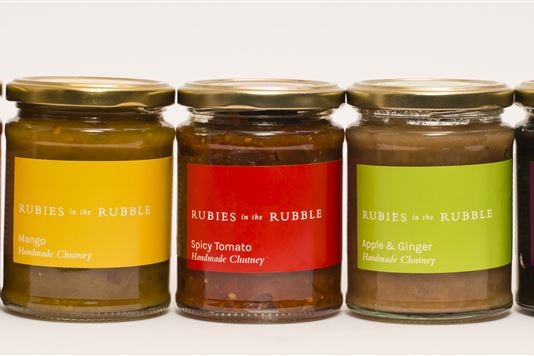
Alicia Lawson is the co-owner of Rubies in the Rubble chutney and jams, which only uses fruit and veg destined for the rubbish bin. Here she talks to us about her vision for a more sustainable world…

Saving curly cucumbers
Our Rubies in the Rubble company uses fresh fruit and veg which would otherwise go to waste to make delicious, premium chutneys and jams. By doing so we hope to reduce unnecessary food waste, but also to create jobs for Londoners struggling to get back onto the work ladder. From our kitchen based in New Spitalfields fruit and vegetable market, we divert perfectly good unsold produce from the dump, by buying the traders’ surplus at the end of the day to go straight into the cooking pot. We also work directly with UK farms, taking what are known as ‘outgrades’ – curly cucumbers, tiny peppers, too soft tomatoes – which have failed to meet stringent supermarket specifications. From carrots to asparagus and lettuce, these can often represent over 20% of a farmer’s crop, but they all taste great in chutney.
The answer to a sustainable world
Cut out what we’ve never used
In other words, there is a massive amount of slack in our current food system, which has been developed not to feed a growing global population, but to create profitability- and therefore excess. Just a small amount of tightening up could make a huge difference to our environment. And the beauty is improvements in this area don’t require any sacrifices- we just need to cut out what we haven’t been using in the first place. The benefits of saving food from waste can be measured financially, environmentally, and even (as we’ve discovered by creating a business from food waste) socially. But we don’t want people to stop at simply buying our products. The problem is linked to far larger issues of consumer attitudes, and it’ll require more than the sale of even thousands of jars of chutney to solve it completely. We deal with produce wasted upstream of the consumer, and yet in the UK the greatest amount of food waste is created in households, from food thrown away in the privacy of people’s homes.
Supermarket secrecy
Currently, however, they’re under no legal obligation to publish their waste figures, because the information is deemed to be ‘commercially sensitive’. Simple legislative changes which require supermarkets to publish these kinds of data would be an instant way of making supermarkets reduce their waste, if only to save their environmental credentials. It’s not an unrealistic goal, provided that food waste wins itself enough of a public profile, and that there’s enough public pressure on them to do it. So, next time you have some leftovers, save them, enjoy them (with some chutney!), but also talk about them. It’s political.
You might also like
The man who made hospital food edible, enjoyable and sustainable